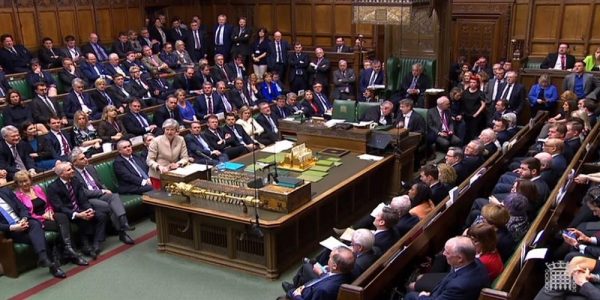
The imperialist bloc of the European Union is going through a deep crisis. And it can get worse.
In the first two votes, the deal of Prime Minister Theresa May with the European Union was rejected: by 432 votes in the first time and 391 in the second one. They were hard blows, yet May pushed on and prepared a new vote in Parliament. She even offered her resignation in order to win the support of the hard Brexit supporters of her party.
But the third time wasn’t the charm. The May-Brussels proposal was rejected again by 58 votes (344 against 286) when she needed 318 to have the majority and extend the exit deadline to May 22, as demanded by the EU. Therefore, the Brexit date has been set on April 12. “I’m afraid we are reachingthe limits of this process in this Chamber” said the PM.
May has been supporting the blows thus far, but this uppercut has left her close to a knockout. Labour leader Jeremy Corby asked for May´s resignation and a call to general elections.
The president of the European Council, Donald Tusk, also felt the impact and has called for a summit on April 10, two days before the UK exit date.
On the “clean exit” or “hard Brexit” dilemma, he has gotten closer to the later. Yet the last word hasn’t been said, because there are variants: easening terms and dates, calling a new referendum, and others; anything is possible when crisis reigns. The English define the situation as chaotic and there have been mobilizations in favor of remaining in the EU.
The 27 members of the imperialist bloc will meet on April 10, on the eve of Easter Week, when they planned on being on holiday. They will meet with an eye on the European Parliament elections of May 26. The hardest wing is led by France, Spain and Belgium who condition the extension of the deadline to the participation of the United Kingdom in the elections to the European Parliament.
On the opposite end is Donald Tusk, supporter of rushing the possibilities of the United Kingdom renouncing Brexit or accepting a soft exit that would keep the country in the European market. Germany, Netherlands and Hungary do not discard any option.
The political divergences are based on the potential economic damage. The groups dispute who willpay less for a rupture without a deal. The EU knows it will suffer, because it enjoys an elevated surplus with the United Kingdom (67.000 million pounds in 2017), and over 4,5 million Europeans live or work in British territory. However, the greatest economic damage would be dealt to the United Kingdom, whose exports depend in over 40% on the European market, while the inverse is 8%.
A no-deal Brexit could also unleash a conflict between Ireland and the rest of the European Union. Brussels insists, with the support of Berlin, that without ratifying the exit deal, it would be necessary to establish customs control points on the border between Ireland and Northern Ireland, to protect the internal European market. Dublin discards a hard border and seems willing to accept only priorcontrols, far from the border.
We cannot expect anuthing from the negotiations between imperialist blocs and bourgeois governments. With them, the result is obvious: working people will be the most harmed. The EU is a bloc of exploitation and oppression at the service of the profits of multinational companies, the banks and the rich.
The Troika leads the imperialist bloc on the path of austerity plans, destroying workers´ conquests and causing usurer debts with the states. Capitalism will never favour the great majorities.
The economic oppression of those on the bottom is combined with the cutting of economic liberties and xenophobia. Usually, the so-called “advanced democracies” leave immigrants die in the Mediterranean sea. The EU takes its member countries from crisis to crisis, that is why it is more necessary than ever to break with the imperialist bloc.
The exit must not be led by the bourgeoisie and its governments, who have no intention of ending the system of capitalist profits. It is fundamental for the working class to not be led by the parties that represent the powerful, to mobilize independently and take up the construction of a socialist and revolutionary political alternative. In the Anticapitalist Network and the Turkish SEP, with the agreements we have reached, we are at the service of advancing in that challenge.
Ruben Tzanof
- https://soles.org.es/2019/01/17/espana-y-la-ue-reinos-de-la-incertidumbre/








